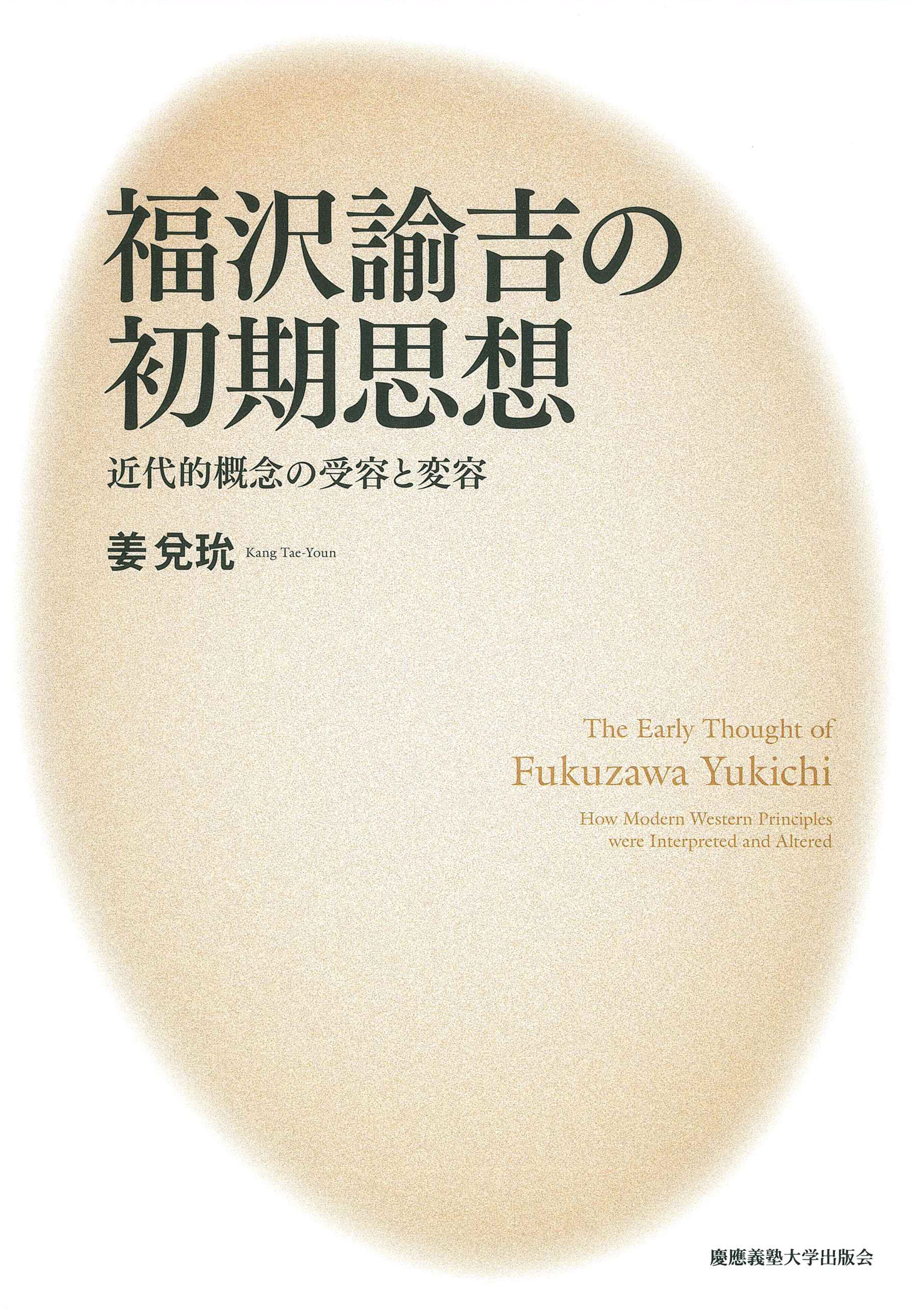福沢諭吉の初期思想: 近代的概念の受容と変容
本書は、幕末から明治初年における福沢諭吉の思想に焦点を当てて、この時期、福沢諭吉が西洋からどのような近代的概念を受容し、そしてその概念をどのように変容させて日本社会に伝えようとしたのかを詳しく分析しています。
この時期の福沢諭吉の著作は、西洋の書物の翻訳が中心でした。従来の福沢研究の中で、福沢諭吉の初期思想を分析する際にこれまで主に採られてきたアプローチは、すぐれた翻訳者としての福沢諭吉が、この時期に読んだと思われる西洋の書物を特定し、そのうえで、その書物の内容および起源(成り立ち)を探究していくというように、原典の思想的潮流を検討することに主眼が置かれてきました。
これに対して本書では、この時期に福沢諭吉が読んだ西洋の地理書、教科書、百科事典等を丁寧に読み解き、そのうえで、当時の福沢諭吉が翻訳して刊行した著作の文章と根気よく対照させ、その翻訳過程を丹念に検証していきます。
たとえば、福沢諭吉は西洋中心の人種観を受け入れはしましたが、その中で「半開」と位置づけられていた日本については、翻訳過程でその記述を削除しました。
また、西洋の自然権思想の受容についても、当時の日本社会の事情などを考慮して、その根源となる「神」に関連する原典の記述を、そのまま翻訳することには慎重な態度をとりました。
さらに、西洋から「自由」や「礼儀」、「学問」、「親孝行」などの概念を取り入れるに当たり、「分限」という言葉を用いて、自己制御の必要性を説きました。
このほか、中産層(ミドルクラス)の育成構想や自由民権運動への批判的な視点も、この時期にすでにあらわれていること等も検討しています。
このように本書は、卓越した翻訳者であった福沢諭吉が、何を、どのように訳し、そして何を訳さなかったのか、その思想的奮闘を通じて、日本社会の実情にあわせ西洋の近代的概念を自家薬籠中の物としていく過程を丹念に辿っています。
Focusing on Fukuzawa Yukichi's thought from the end of the Edo period to the beginning of the Meiji era, this book provides a detailed analysis of what modern concepts Fukuzawa Yukichi received from the West during this period and how he transformed those concepts and tried to convey them to Japanese society.
Fukuzawa Yukichi's writings during this period were mainly translations of Western books. The approach taken by conventional studies of Fukuzawa Yukichi in analyzing his early thought has focused on examining the ideological currents of the source texts by identifying the Western books that Fukuzawa Yukichi, a skilled translator, may have read during this period and then exploring the contents and origins (origins) of those books. The main focus of this book, on the other hand, is to examine the ideological currents of the original sources.
In this book, on the other hand, we carefully read the Western geography books, textbooks, encyclopedias, etc. that Yukichi Fukuzawa read during this period, and then patiently compare them with the texts of the works he translated and published at that time, carefully examining the translation process.
For example, although Yukichi Fukuzawa accepted the Western-centered view of race, he deleted descriptions of Japan, which was positioned as "semi-civilized" in that view, in the translation process.
Also, with regard to the acceptance of the Western idea of natural rights, he was cautious about translating the descriptions of "God," the root of the idea, as they were in the original texts, taking into consideration the circumstances of Japanese society at that time.
Furthermore, in introducing such Western concepts as "freedom," "courtesy," "learning," and "filial piety," he used the word "Bun-gen" to emphasize the need for self-control.
In addition, the book also examines how the concept of fostering a middle class and a critical viewpoint toward the liberal civil rights movement were already present in the West during this period.
In this way, this book carefully traces the process by which Yukichi Fukuzawa, an outstanding translator, translated what and how he did and what he did not translate, and through his ideological struggles, adapted modern Western concepts to the realities of Japanese society and made them his own medicine.
この時期の福沢諭吉の著作は、西洋の書物の翻訳が中心でした。従来の福沢研究の中で、福沢諭吉の初期思想を分析する際にこれまで主に採られてきたアプローチは、すぐれた翻訳者としての福沢諭吉が、この時期に読んだと思われる西洋の書物を特定し、そのうえで、その書物の内容および起源(成り立ち)を探究していくというように、原典の思想的潮流を検討することに主眼が置かれてきました。
これに対して本書では、この時期に福沢諭吉が読んだ西洋の地理書、教科書、百科事典等を丁寧に読み解き、そのうえで、当時の福沢諭吉が翻訳して刊行した著作の文章と根気よく対照させ、その翻訳過程を丹念に検証していきます。
たとえば、福沢諭吉は西洋中心の人種観を受け入れはしましたが、その中で「半開」と位置づけられていた日本については、翻訳過程でその記述を削除しました。
また、西洋の自然権思想の受容についても、当時の日本社会の事情などを考慮して、その根源となる「神」に関連する原典の記述を、そのまま翻訳することには慎重な態度をとりました。
さらに、西洋から「自由」や「礼儀」、「学問」、「親孝行」などの概念を取り入れるに当たり、「分限」という言葉を用いて、自己制御の必要性を説きました。
このほか、中産層(ミドルクラス)の育成構想や自由民権運動への批判的な視点も、この時期にすでにあらわれていること等も検討しています。
このように本書は、卓越した翻訳者であった福沢諭吉が、何を、どのように訳し、そして何を訳さなかったのか、その思想的奮闘を通じて、日本社会の実情にあわせ西洋の近代的概念を自家薬籠中の物としていく過程を丹念に辿っています。
Focusing on Fukuzawa Yukichi's thought from the end of the Edo period to the beginning of the Meiji era, this book provides a detailed analysis of what modern concepts Fukuzawa Yukichi received from the West during this period and how he transformed those concepts and tried to convey them to Japanese society.
Fukuzawa Yukichi's writings during this period were mainly translations of Western books. The approach taken by conventional studies of Fukuzawa Yukichi in analyzing his early thought has focused on examining the ideological currents of the source texts by identifying the Western books that Fukuzawa Yukichi, a skilled translator, may have read during this period and then exploring the contents and origins (origins) of those books. The main focus of this book, on the other hand, is to examine the ideological currents of the original sources.
In this book, on the other hand, we carefully read the Western geography books, textbooks, encyclopedias, etc. that Yukichi Fukuzawa read during this period, and then patiently compare them with the texts of the works he translated and published at that time, carefully examining the translation process.
For example, although Yukichi Fukuzawa accepted the Western-centered view of race, he deleted descriptions of Japan, which was positioned as "semi-civilized" in that view, in the translation process.
Also, with regard to the acceptance of the Western idea of natural rights, he was cautious about translating the descriptions of "God," the root of the idea, as they were in the original texts, taking into consideration the circumstances of Japanese society at that time.
Furthermore, in introducing such Western concepts as "freedom," "courtesy," "learning," and "filial piety," he used the word "Bun-gen" to emphasize the need for self-control.
In addition, the book also examines how the concept of fostering a middle class and a critical viewpoint toward the liberal civil rights movement were already present in the West during this period.
In this way, this book carefully traces the process by which Yukichi Fukuzawa, an outstanding translator, translated what and how he did and what he did not translate, and through his ideological struggles, adapted modern Western concepts to the realities of Japanese society and made them his own medicine.

出版社
KEIO UNIVERSITY PRESS(慶應義塾大学出版会)
ISBN
9784766428384
出版年
1 Jan 2022 – 30 Nov 2022
専門
社会科学
テーマ
社会
宗教
人権
歴史学
地域
日本